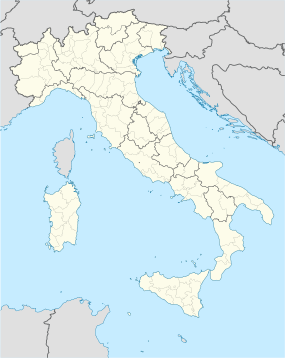Terina (ancient city)
| Τερίνα | |

The site of Terina in 2013. It has become overgrown with vegetation since it was excavated in 1997, but the traces of the excavations are still evident on satellite photos.
|
|
| Location | Sant'Eufemia Vetere, Province of Catanzaro, Calabria, Italy |
|---|---|
| Region | Magna Graecia |
| Coordinates | 38°56′22″N 16°14′2″E / 38.93944°N 16.23389°ECoordinates: 38°56′22″N 16°14′2″E / 38.93944°N 16.23389°E |
| Type | Settlement |
| History | |
| Builder | Settlers from Croton |
| Founded | 480–470 BC |
| Periods | Classical Greece to Roman Empire |
Terina (Ancient Greek: Τερίνα) was an ancient city of Magna Graecia on the north shore of the Gulf of Saint Euphemia, about 20 km (12 mi) from Lamezia Terme in Calabria. The site of the city was allegedly found in 1922 by the archaeologist Paolo Orsi near the modern village of Sant'Eufemia Vetere, but a systematic archaeological investigation was only started in 1997 and it is only based on coins found there. Coins, inscriptions and other artefacts retrieved from the site can be seen in the Museo Archeologico Lametino in Lamezia Terme. However, the actual collocation of the ancient city is in Nocera Terinese where the original location is situated on top of a hill called Piano di Tirena. This hill is surrounded by two rivers merging, Savuto and Grande, and it perfectly matches the description provided by the Greek historian Strabo in his major work Geographica, which was first published around 20 AD.
In the fifth century BC the Greek cities Croton and Locri, both located on the Ionian Sea, vied for the control of ports on the Tyrrhenian Sea. These ports were important for conducting trade. Locri had founded the cities Medma and Hipponium there and had assumed control of Metauros. Temesa lay north of Hipponium and had close relations with Croton, which may have been its mother city. Temesa was valuable because of its copper mines and its trade with the north. Locri conquered Temesa at some time in the first half of the fifth century BC, probably in the 480s or 470s. Croton was disadvantaged by the loss and founded Terina at this time to compensate. Terina's foundation is dated to 480–470 BC. It started minting its own coins sometime after 480 BC, which indicates that it soon became independent from its mother city.
...
Wikipedia

